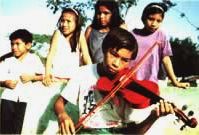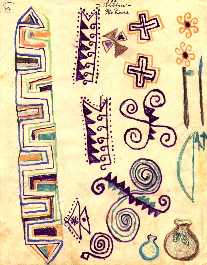
an epidemic of suicides unequalled in South America
'The Guarani are committing suicide because we have no land. We don't have space any more. In the old days, we were free, now we are no longer free. So our young people look around them and think there is nothing left and wonder how they can live. They sit down and think, they forget, they lose themselves and then commit suicide.'
Rosalino Ortiz
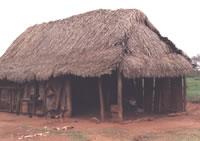
Guarani
| Paraguay, Brazil, Bolivia and Argentina | |
| around 80,000 |
famous for its poverty and hard times
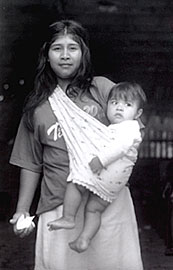
Herman Mascietti is a young lawyer representing the more radical group of Guaranis led by Romero. He feels that the Seabord company is playing underhanded games with the Guarani community by letting Pena control who accesses the Loma. He sees the privileges accorded to the Guarani that 'tow the line' of the company as a sort of bribe. He explains that "New houses, guaranteed employment for the children of the leaders and other goodies of the sort serve but to divide the Guarani community".
Mascietti claims that "the company has a three part strategy to discount the Guaranis legitimate claim to the Loma", and in preparation for a court case on November 23rd regarding the Guaranis claim to the Loma, he notes that "there is political interference in the Guarani community: the company works with the police force, the government and the local media, and represses the Guarani through a privately owned security company called Search".
Guillermo Jaculika, an engineer and public relations person for the company doesn't hesitate in giving a blunt characterization of the situation. "The ancestral claim to the Loma is a fiction", he says, "supported by a lawyer trying to give credibility to a false claim". Guillermo is unapologetic in his dismissal of the demands advanced by the Guaranis looking to reclaim the Loma, reiterating that "An archeologist hired by the company surveyed the Loma, and found nothing older than the remains of Guaranis who came from Bolivia (in the early 20th century) to work for the Tabacal corporation".
The importance of the seemingly unused Loma to the corporation is explained by Guillermo as resting in the water canals that were constructed in order to irrigate the company's sugar cane crops. He feels that if people lived on the Loma, there would be "a high risk of contamination and erosion, because if the community was to use this water, it's quality and volume would no longer be guaranteed".
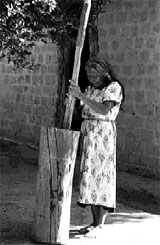
While the dispute among the Guaranis in regards to their differing histories is confusing, according to University of British Columbia anthropologist, Gaston Guillermo, the question should not be on tenterhooks. His research on the Guarani peoples lead him to assert that "there is, without a doubt, a Gaurani presence in the region of Oran dating back to the Seventeenth century, however the waves of migration of Guaranis from Bolivia in the early twentieth century are also well documented. What is not clear, at this time, is the relation between the two".
Where do ancestral rights begin and end for the Guarani people, whose occupation of the Loma is argued as having been centuries long by some, and only since the existence of the Tabacal company by others?
